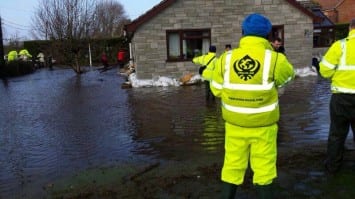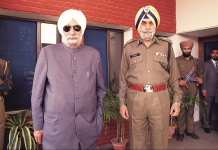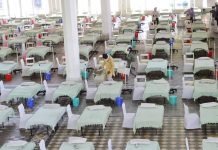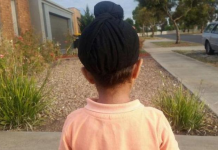


Somerset, UK—Whilst the British Government has been immobilised by indecision, and confusion about its strategic response to the winter floods, Somerset has been left to drown. Large parts of the UK have been submerged under flood waters for months. No. 10 has failed to act as people in the region watch helplessly as their homes, businesses, cattle and crop become subsumed by contaminated water.
Amid the belated Prime Ministerial visits, a royal visit, apologies, blaming, tears and recriminations, the actions of a Slough based charity stands out with its simple, clear effort. Khalsa Aid, a Sikh charity was set up in 1999 to mark the 300th anniversary of the birth of the movement. In recognition of the achievements of the movement in the UK, and observing the plentiful fare on offer at his Khalsa Centre, that Ravi Singh was motivated to launch the charity’s first humanitarian effort in Kosovo.
Recent missions by Khalsa Aid in the Philippines and Haiti have now been followed by a new operation in Somerset last weekend. Observing the failure of authorities to take effective action, and noting that had this flooding taken place in a impoverished country, Khalsa Aid, and other disaster relief charities would have taken action.
This recognition led Khalsa Aid founder, Ravi Singh, to link with a partner in Somerset, and travel to the region to provide manpower, and emergency supplies, which has been welcomed in the area. The television images of Sikhs forming part of a line, side by side with local community volunteers, to pass along supplies, is inspiring, but should not be remarkable.
As Singh says, this is his country and he is simply contributing as a fellow countryman. Sikh faith observers are visibly different from the local inhabitants of the West Country with the rich difference of their appearance, but are not strangers to the area, for Singh confessed that like many in the UK, he goes to the Somerset for his holidays.
A post-racial utopia, in Britain, is one where racial and religious difference does not define the rules of engagement. It is a word where anyone can comfortably live anywhere, a world without ghettos based on race, colour, religion and language. Anyone can go into any shop, barber, hair salon, and expect a service from whoever is working there. No one should have to shop for ordinary services at specialist areas. We should all know each other well enough to live comfortably side by side, irrespective of difference.
We are supposed to be in a post-racial Britain at this point in time. Equality legislation and its protections for ethnic minorities are being eroded. All forms of hate crime, particularly religious hate crime, is on the increase, showing we still have a long journey ahead.
As a faith-based, ethnic minority charity, the action of Khalsa Aid in Somerset provides a glimpse of what a post-racial Britain could look like. True, like politics, disaster makes strange bedfellows. When the flood waters have subsided, the houses dried out, and businesses back up on their feet, this is the side by side integration, and understanding that must become part of race relations in British future. A future where racial and religious differences are not causes for division, suspicion and discrimination, but for celebration. Difference can be cohesive, and Khalsa Aid has shown us how.




